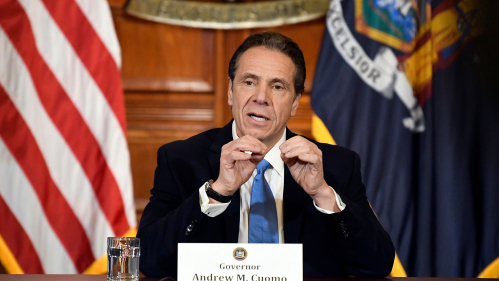Andrew Cuomo’s Bombshell Resignation Explained

New York Governor Andrew Cuomo resigned today in an astonishing fall from grace a week after a report by state attorney general Letitia James concluded he had sexually harassed nearly a dozen women. Saladin Ambar, a professor of political science and senior scholar at the Center on the American Governor at the Eagleton Institute of Politics at Rutgers University-New Brunswick, explains the scandal that became the downfall of the once widely popular Democratic governor.
Why do you think Cuomo ultimately made the decision to step down?
Given the legal and political realities, I think Cuomo decided that defying reality was no longer going to serve him. But I also hope, and I realize it may be a misplaced one, that the governor also decided that his legacy as a father and a human being mattered to him and that the path towards redemption had to begin with his resigning the office that has meant so much to him.
Why was this the right thing to do in response to the allegations?
Because there was a clear, impartial process – one that Cuomo had initially supported. The James report was detailed and it was a very damning account of his behavior. Given the pressing needs of New Yorkers, resigning and removing the distraction from governing was the right thing to do.
Before the MeToo era would these allegations have cost him the governorship?
Probably not. But the severity of these allegations was substantial – and coupled with the political moment made the governor's resignation or removal from office inevitable. I think that the incoming governor will also be a woman is a testament to the changing political landscape – one still woefully lacking in women's executive leadership. But we are getting there.
How does social media play a role in pressuring politicians to make these moves?
Social media giveth, and it taketh away. Andrew Cuomo, and memes about him and his brother, CNN reporter Chris Cuomo, were all the rage months ago. But the worm turns quickly in our social media age, and what might have been a multi-year scandal in the past, has been brought to the fore and resolved nearly overnight it seems.
How do you think this will affect the state's leadership on the COVID crisis and gun violence and bring NYC back?
Between Andrew Cuomo's governorship and former New York governor George Pataki, there was a carousel of short-term governors in New York. I think a legitimate concern is how well any new governor will be able to manage these multiple crises now that 14 days hence, Andrew Cuomo will no longer be in office. But that is the point of living in a democracy – no one individual is indispensable.
At the height of the pandemic, Cuomo’s popularity soared, and terms like “America’s Governor” pervaded the mainstream. Did that somehow make him believe his behavior was politically acceptable?
I think what the newfound popularity gave the governor was an opportunity. But it was squandered with an ill-timed book deal; with a cover-up over nursing home deaths; and then with a cover-up over his behavior now well-documented in the James report. Andrew Cuomo has historically been his own worst political enemy. You can't "downplay" your character. Until today, he has seldom if ever, accepted personal accountability. I hope it is a step forward for him, and as someone born in Queens and who admires the legacy of his father, I most certainly hope it is a step forward for the people of New York.
Ambar is the author of “American Cicero: Mario Cuomo and the Defense of American Liberalism” and the forthcoming “Stars and Shadows: The Politics of Interracial Friendship from Jefferson to Obama.”


